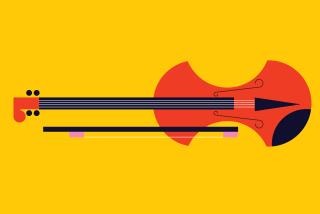Microchips aren’t just for pooches
- Share via
People have put microchips in cars and pets to help recover them if they’re stolen or lost. Now Todd French, a cellist with the Los Angeles Opera orchestra and founder of StringWorks, a stringed instrument retailer, has devised a system to install similar chips in violins, guitars and other musical instruments. French’s ISIS (Instrument Security Identification Systems) implants a rice-sized chip into the base of the instrument, with an ID number than can be read by a scanner. The chip, he says, doesn’t adversely affect tone quality.
“More than a million musical instruments are stolen each year, and only 2% are recovered,” French says. “People form an attachment to their instruments. When one is stolen, they say: ‘I don’t want another one. I want this one. Don’t give me an insurance check.’ ”
French launched his system June 16. He has about 170 music retailers signed up and wants to widen the field to repair shops and pawnshops across the county and to Canada and Britain. The price ranges from $14.99 to $99.99 per year, depending on the instrument’s value. The company will pay dealers upon successful recovery.
“People have asked about installing a chip into a bow,” French says. “That’s a lot harder because you can change the balance.”
Los Angeles Philharmonic principal second violinist Lyndon Taylor just had an ISIS chip installed in his Guadagnini violin, which, though valued at between $350,000 and $450,000, isn’t “a celebrity instrument that is readily identifiable and which everybody would know about if it were stolen,” he says.
-- Chris Pasles
More to Read
The biggest entertainment stories
Get our big stories about Hollywood, film, television, music, arts, culture and more right in your inbox as soon as they publish.
You may occasionally receive promotional content from the Los Angeles Times.










